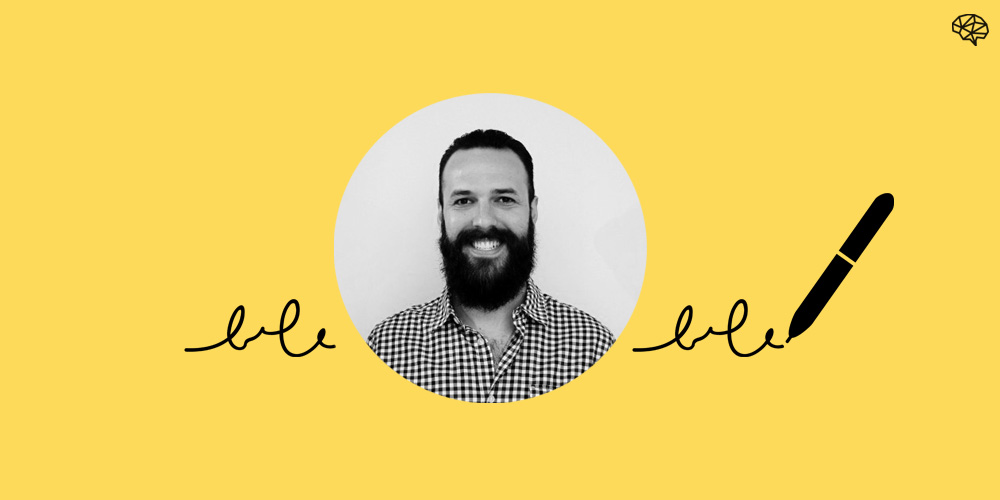Jeremy Horowitz has his plate full.
He’s on a mission to help eCommerce businesses succeed. As the Head of Growth at Daasity, he’s building an analytics platform to help eCommerce businesses scale faster by centralizing, analyzing, and pushing their data. He’s also the host of the Messenger Mastermind Podcast and a seed investor in some up-and-coming eCommerce brands.
On top of everything, he finds time to share great marketing content on LinkedIn while learning Mandarin in his spare time. Of course, I was curious to learn how he managed his time to get so much done. Thanks for sharing your insights Jeremy 🙌.
In this interview, you’ll learn:
- How to effectively utilize your monitor space 💻
- How to use the 5-min rule to conquer overwhelm ⏲
- The value and importance of ruthless prioritization ✂
- How investing will make you a better marketer 📈
Here’s my interview with Jeremy:
What does your daily workflow look like? Describe your typical day.
I’m up at 5am. The morning routine is yoga, read for 20 mins, workout, make breakfast. Then I knock out any investing or podcast work before the “work day” gets started. From 8:30am – 6:30pm it’s heads down on my day job running Marketing at Daasity. After the “work day” is done I cook dinner, spend time with my partner, watch a little TV and in bed by 9:15.
Throughout the day itself I’m jumping through a wide variety of focuses: meetings, managing the team, internal/external comms, posting/engaging on social channels, creating/reviewing content, Analyzing performance, and reporting up. Somewhere in there I also find time to get work done.
What’s your secret to an effective work setup?
I’m fairly simple in this respect. I’ve been remote going on 6 years so I’ve always preferred a simple set up. I have a work laptop and a monitor where I use the Mac spaces on my laptop to have different focuses always on different screens and spaces. I usually break out my screens by:
- IE. Main screen core tools (Calendar/Email, PM, etc)
- Slack in another
- Reporting and Analytics on the big monitor
- Other projects/tasks I need to get to
Everything is set up in dedicated areas so I have simple triggers and patterns to access what I need immediately.
What helps you stay focused?
I plan all meetings and work blocks around 25 or 45 minute increments to naturally build in breaks for myself. I also block off two half-hour slots everyday for lunch and to meditate where I truly don’t do any work during either. The shorter time blocks give me the opportunity to mentally prepare myself for what’s coming next. The blocks for lunch and meditation allow me to prevent what I call “brain overheating” and help me get through the afternoon push. Especially since I don’t drink caffeine.
“In a marketer’s day we’re usually jumping to 15 different projects that require completely different brain functions and skills sets. Managing the switching cost is crucial for me.” – Jeremy Horowitz
What do you do when you’re feeling overwhelmed?
Meditate, play music, or go for a walk.
At this point for me, feeling overwhelmed is usually a function of too much stress/anxiety, so I do things that help me destress. I’m a big believer in the 5-minute rule when things get really bad: set a timer, do what you need to do in 5 minutes to feel better and then let whatever is stressing you out let it go.
You’re a growth marketer, investor, and podcast host. How do you prioritize your work effectively?
A combination of the OKRs, the Eisenhower Matrix, Calendar Blocking, and Ruthless prioritization. Also I’ve gotten really comfortable saying no to projects/things that aren’t aligned to my priorities.
OKRs set clear goals that set where we want to go. It’s a simple layout of what we need to accomplish in a given time period (usually modeled annually and tracked quarterly). This is the roadmap of what to focus on. Once you have OKRs, the Eisenhower matrix is a great process to determine what to work on and when.

Ruthless prioritization is honestly the hardest part about this process. This is where the team usually pushes back the most and conviction needs to hold strong. The constant balance of being nimble and building/sticking to a plan is an interesting challenge I’m always working on improving. Once I know where we’re going and what the priorities are, I block every 15 minute interval in my calendar to accomplish what’s laid out.
“Your calendar reflects your priorities, and if you don’t fill your calendar with your priorities, someone else will fill it with theirs.” – Jeremy Horowitz
How do you strike the right work-life balance?
I’m honestly still working on this and don’t have the best advice since I currently work 6-7 days/wk.
I think you really need to take an honest inventory of your life and where you are today to determine what your priorities are.
For me, I try to make the most of the time I have with my partner, not working nights (including responding to emails/slacks after I close my laptop) and making sure that there’s one day a week I focus on my passions instead of work. I’m working on adding more vacations into my schedule to properly take time off, because stepping away usually provides me with the most clarity.
At the end of the day it’s really about being present in the moment of whatever it is you’re doing more than a dedicated amount of time.
What book or podcast has shaped the way you work or think?
Too long to list here. I’ve actually used to write blog posts of book summaries (2018 list and 2019 list). Here are some really influential authors in general:
- Russell Brunson on Digital Marketing/Business
- Andy Grove and Ben Horowitz on Leadership/Company Building
- James Clear and Charles Duhigg on Productivity and Habits
- Daniel Kahneman, Robert Spolsky, and Robert Cialdini on Psychology Behavior and how people work.
Editor’s note: check out our full list of recommended books for marketers, leaders, and founders.
Share one productivity tool or tip that has impacted the way you work.
Running your marketing projects with Scrum methodologies and a project management tool (like Asana, Trello, Monday). A decent portion of my early career was spent as a software Product Manager and that project management/prioritization process allows me to produce exponentially more results with fewer resources because of the efficiencies you create for the team. I also run all of my projects on the same foundation.
The velocity at which you, and the team, get work done becomes a function of how much success you can have. When you properly build a scrum function you can start to automate yourself out of a job, which at the end of the day is my real goal.
Any parting advice for today’s marketers?
Take a couple thousands dollars and invest it.
If you want to truly be an effective Marketing leader in today’s age you need to think of yourself as a portfolio manager just as much as a creative marketer. Everyone expects trackable ROI on the dollars you spend and you need to think about the programs you deploy as investments.
One of the best things to happen to me as a marketer was my dad teaching me to invest in the stock market as a teenager. The lessons around how to analyze an opportunity, build a return model, and have the patience to see that investment come to fruition is crucial in the success I’ve had as a marketer today. You also need to constantly show that you know how to make money.
**
Thank you Jeremy!
You can find Jeremy Horowitz on LinkedIn.
✌




